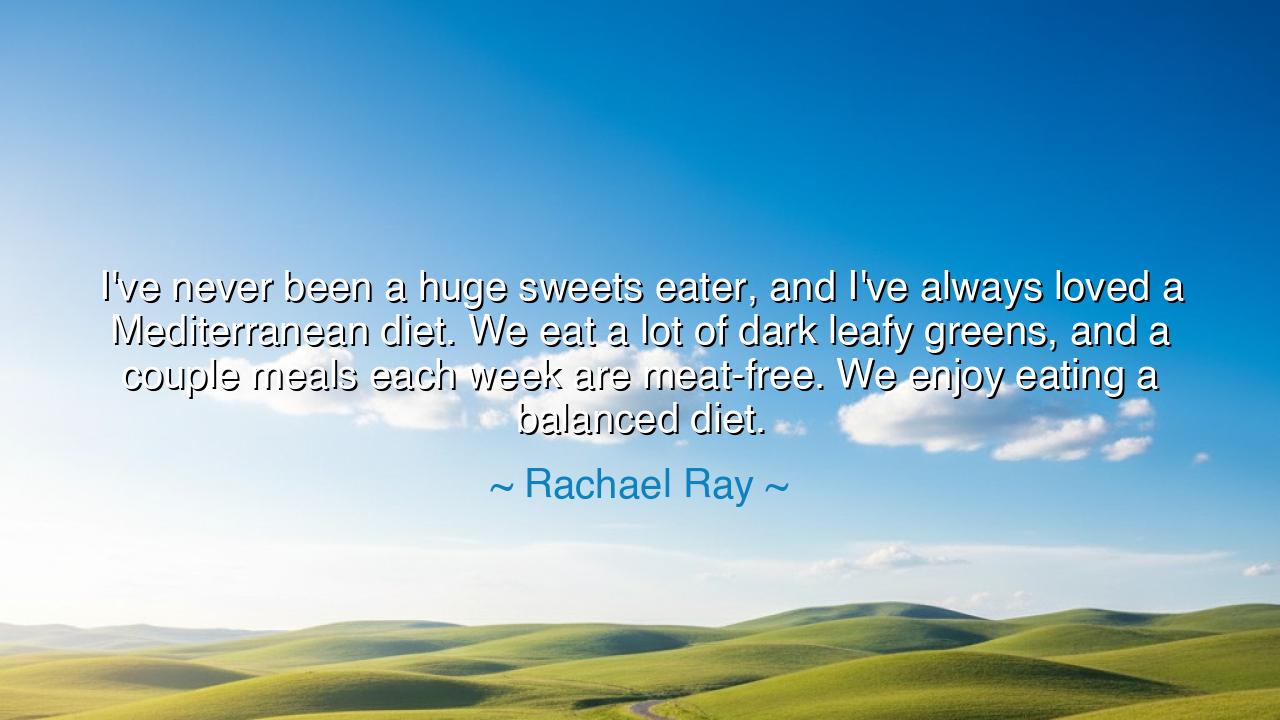
I've never been a huge sweets eater, and I've always loved a
I've never been a huge sweets eater, and I've always loved a Mediterranean diet. We eat a lot of dark leafy greens, and a couple meals each week are meat-free. We enjoy eating a balanced diet.






"I've never been a huge sweets eater, and I've always loved a Mediterranean diet. We eat a lot of dark leafy greens, and a couple meals each week are meat-free. We enjoy eating a balanced diet." These words, spoken by Rachael Ray, reflect a philosophy of living that dates back to ancient times, one that emphasizes moderation, balance, and a deep respect for the natural rhythms of the body. In a world overwhelmed by processed foods and the constant pursuit of indulgence, Ray’s embrace of the Mediterranean diet is a return to a simpler, more nourishing way of living—a way that supports both health and vitality. Her approach, rooted in vegetables, whole foods, and meat-free meals, offers a profound lesson about the power of balance and intentional eating in achieving long-term wellness.
In the ancient world, balance was regarded as the key to both health and virtue. The Greeks, in particular, understood that the body and mind must be aligned for true well-being, and they developed a diet that was simple, wholesome, and full of fresh produce. Hippocrates, the father of medicine, famously said, "Let food be thy medicine, and let medicine be thy food." His teachings emphasized that the foods we consume have the power to heal, strengthen, and restore the body. In this ancient wisdom, we see the essence of Ray’s approach: to eat in a way that not only nourishes the body but also supports mental and physical clarity. Her focus on leafy greens and meat-free meals mirrors the Greeks’ emphasis on a diet rich in plants, known for their healing properties.
The Mediterranean diet—with its emphasis on vegetables, healthy fats, whole grains, and moderate meat consumption—has long been associated with longevity and vitality. The ancient peoples of the Mediterranean, particularly the Greeks and Romans, ate in harmony with the earth, consuming foods that were locally sourced and rich in nutrients. They recognized that moderation in all things, including food, was the path to a strong and healthy body. The Romans, who cherished both physical strength and intellectual clarity, also practiced a balanced approach to eating. Their meals were simple, often built around vegetables, legumes, and fish, with meat reserved for special occasions. This balanced approach, which we see reflected in Ray’s Mediterranean diet, was integral to their ability to lead both active and fulfilling lives.
Consider the example of Pythagoras, the great Greek philosopher, who was a strict advocate of vegetarianism. Pythagoras believed that by eating simple, plant-based foods, one could elevate both the body and the mind. He saw food as a means of connecting with the natural world and aligning oneself with the higher order of the universe. For Pythagoras, eating dark leafy greens and avoiding excess was a spiritual practice as much as a physical one. In much the same way, Ray’s diet, with its emphasis on plant-based meals and balance, is an acknowledgment that the body must be cared for with simplicity and respect. It is a reflection of the ancient belief that food can elevate our minds and spirits, leading us to greater wisdom and clarity.
The ancient Romans also held that balance in diet was essential to both physical and mental strength. Cicero, the Roman philosopher, wrote extensively on the importance of moderation and self-control in all areas of life, including food. He believed that indulgence in food and drink clouded the mind and weakened the body. The Romans embraced a diet that was simple yet nourishing, designed to sustain their physical strength and mental clarity. Ray’s words, with her focus on a balanced diet, are a modern echo of this ancient wisdom. By focusing on vegetables, lean proteins, and healthy fats while limiting excess, she aligns herself with the principles of moderation and well-being that have been passed down through centuries.
The lesson in Ray’s words is clear: true health is found not in indulgence or deprivation, but in a balanced approach to eating—one that nourishes the body, supports mental clarity, and honors the rhythms of nature. In a world where food often becomes a source of guilt, stress, or disconnection, Ray’s approach is a reminder that eating should be a celebration of life, a way of honoring the body and the earth. The Mediterranean way of eating, with its focus on fresh, natural ingredients and a mindful approach to food, offers us a path to longevity, vitality, and peace.
In practical terms, Ray’s Mediterranean diet teaches us to approach food with mindfulness and intention. It invites us to embrace simplicity, to choose whole, nutrient-dense foods like leafy greens, vegetables, and healthy fats, while limiting foods that do not serve the body’s long-term needs. It calls us to eat mindfully, to appreciate the nourishment that food offers, and to align our eating habits with our goals for health, strength, and clarity. Whether or not we follow the Mediterranean diet, the principle remains the same: balance is key, and we must nourish our bodies in a way that supports our whole selves—body, mind, and spirit.
Thus, let us take Rachael Ray’s words to heart and embrace the wisdom of balance and moderation in our own lives. Let us choose foods that sustain and nourish us, that promote mental clarity and physical vitality, and that connect us to the ancient wisdom of those who understood the deep connection between food and well-being. In doing so, we will walk the path of true health, embracing a life of balance, purpose, and fulfillment—a life that is nourishing in every sense of the word.






AAdministratorAdministrator
Welcome, honored guests. Please leave a comment, we will respond soon